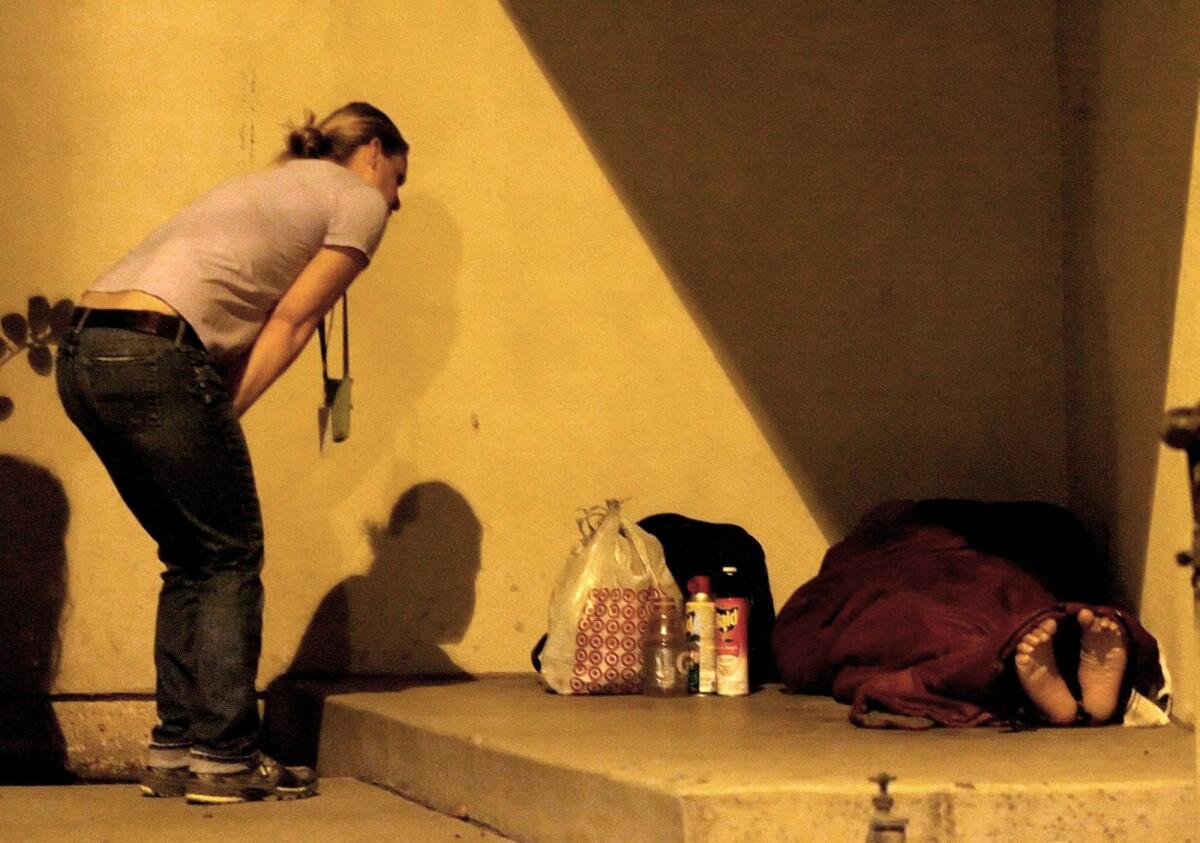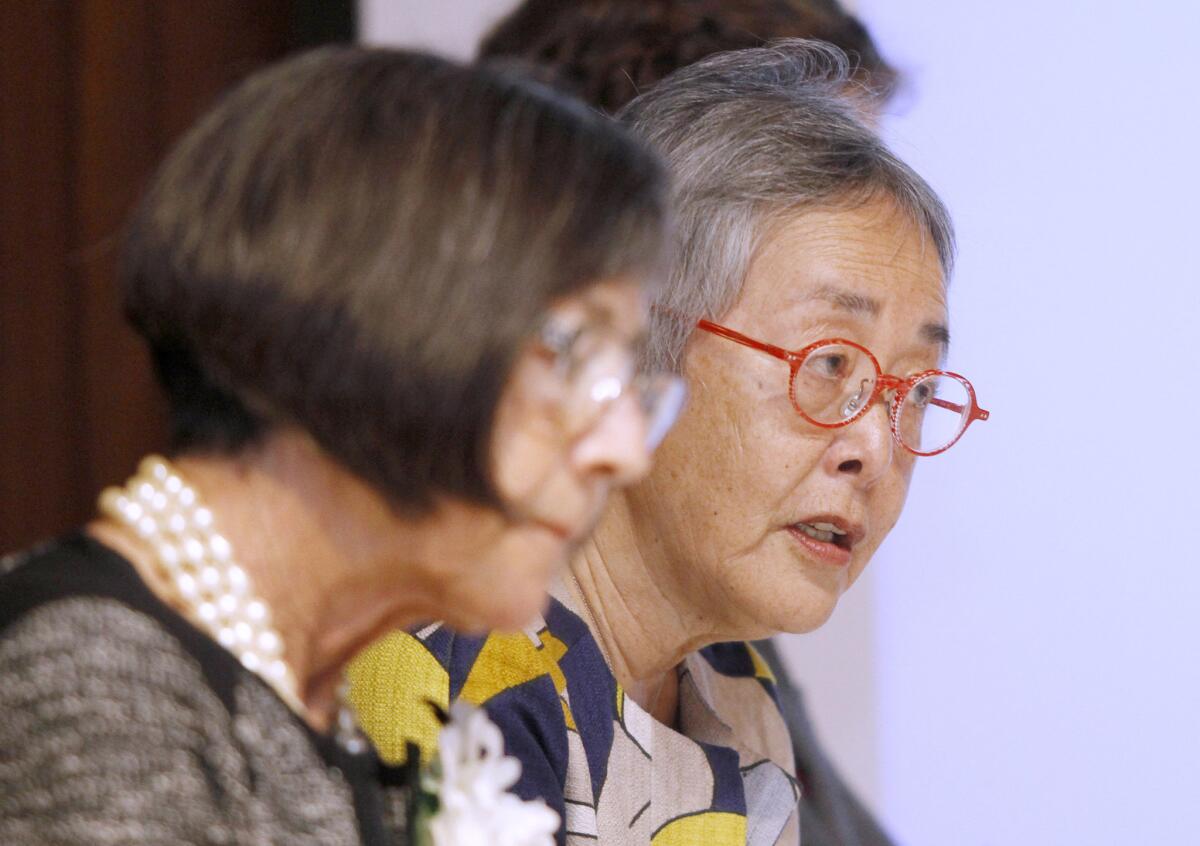Sen. Liu introduces bill that aims to buoy the rights of the homeless

In this file photo from Aug. 9, 2011, Housing Works’ Sieglinde von Dessner attempts to speak with Fernando Ruiz, who at the time had been homeless and living on the streets of Pasadena for five years.
In a legislative bid to prevent discrimination against the homeless, state Sen. Carol Liu (D-La Cañada Flintridge) has authored a bill prohibiting members of law enforcement from citing or arresting such individuals for eating, resting and practicing their religion in California’s public spaces.
Introduced on Jan. 14, Senate Bill 876 also provides a legal framework for homeless people to sue public entities for violating their rights under such a law, should it pass, for damages of $1,000 per violation. It runs parallel to a $2-billion bond for homeless housing and wrap-around services being proposed by state Sen. Kevin de León.
“Being homeless should not be a crime,” Liu said in an email interview Monday. “(Under this measure) local authorities can’t cite a homeless person for doing the same thing that any other person would be allowed to do, like eating or resting, in a public space.”
NEWSLETTER: Stay up to date with what’s going on in the 818 >>

Sen. Carol Liu (D-La Cañada Flintridge) speaks at a hearing on aging and long-term care at the Glendale Central Library in this file photo from July 8, 2014. On Jan. 14, Liu introduced a bill that prohibits law enforcement from citing or arresting homeless people for eating, resting and practicing their religion in public spaces.
Officials in the city of La Cañada Flintridge, Liu’s hometown, question the wisdom of removing local law enforcement’s ability to “address important issues affecting public health and safety in public spaces,” according to an official letter of opposition passed in a March 15 council meeting and sent to Liu’s Sacramento office.
“It takes local control out of the hands of local government,” said Mayor Dave Spence, in whose name the letter was sent. “It would tie the hands of the sheriff’s department to be able to do anything.”
Spence added there is currently no city law prohibiting the area’s homeless from using public spaces, including City Hall and facilities such as city parks.
La Cañada City Manager Mark Alexander said the language in SB-876 is too vague for municipalities to adequately interpret what actions would be allowable under the law.
“It is not clear as to the extent of the homeless individual’s rights to use public property and public facilities to rest peaceably,” Alexander said in an email. “The bill is sufficiently ambiguous as to raise the concerns of local governments that the bill will create new liabilities for local governments if a homeless person is denied the ability to use public buildings and facilities to rest.”
The city manager added that issues pertaining to homelessness are best addressed at the regional level, where local governments can collaborate to create programs and services to match resources with local needs.
Join the conversation on Facebook >>
So far, according to an SB-876 fact sheet provided by Liu’s offices, support for the bill comes from the American Civil Liberties Union of California, the poverty assistance nonprofit Los Angeles Community Action Network along with several churches and advocates who work with homeless and disabled individuals.
A total of 73 California cities and several other municipalities have taken an opposing stance to the bill, many under the advisement of collective organizations like the League of California Cities, of which La Cañada is a member.
Liu said her office encourages feedback from groups like the LCC on best practices, model programs and funding sources that will enable cities to better respond to the needs of homeless citizens than criminalization, which often comes with even greater costs.
“We remain open to recommendations for improving the bill to accomplish our goal of preventing the homeless from having an arrest record and/or accumulating fines they cannot pay, which can further prevent them from qualifying for housing or education loans,” Liu said. “A society with our resources should be able to assist those who have none.”
The bill is set to go before the state’s Senate Committee on Transportation and Housing in a March 29 hearing in Sacramento.
--
Sara Cardine, sara.cardine@latimes.com
Twitter: @SaraCardine
--
ALSO:
Educator puts brakes on joint resolution opposing 710 extension
La Cañada High students, teachers say goodbye to their hair for cancer research
La Cañada Unified students fend off Mathzilla in districtwide competition
